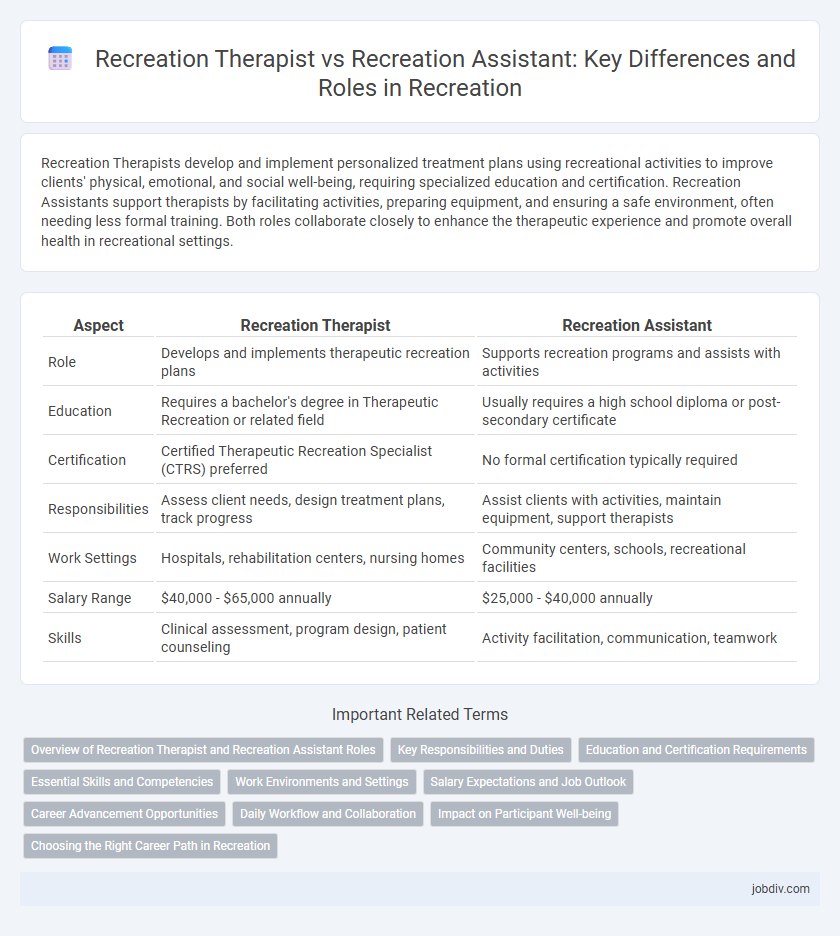Recreation Therapists develop and implement personalized treatment plans using recreational activities to improve clients' physical, emotional, and social well-being, requiring specialized education and certification. Recreation Assistants support therapists by facilitating activities, preparing equipment, and ensuring a safe environment, often needing less formal training. Both roles collaborate closely to enhance the therapeutic experience and promote overall health in recreational settings.
Table of Comparison
| Aspect | Recreation Therapist | Recreation Assistant |
|---|---|---|
| Role | Develops and implements therapeutic recreation plans | Supports recreation programs and assists with activities |
| Education | Requires a bachelor's degree in Therapeutic Recreation or related field | Usually requires a high school diploma or post-secondary certificate |
| Certification | Certified Therapeutic Recreation Specialist (CTRS) preferred | No formal certification typically required |
| Responsibilities | Assess client needs, design treatment plans, track progress | Assist clients with activities, maintain equipment, support therapists |
| Work Settings | Hospitals, rehabilitation centers, nursing homes | Community centers, schools, recreational facilities |
| Salary Range | $40,000 - $65,000 annually | $25,000 - $40,000 annually |
| Skills | Clinical assessment, program design, patient counseling | Activity facilitation, communication, teamwork |
Overview of Recreation Therapist and Recreation Assistant Roles
Recreation Therapists develop customized treatment plans to improve patients' physical, emotional, and social well-being using therapeutic activities and interventions. Recreation Assistants support therapists by organizing recreational equipment, assisting participants during activities, and maintaining a safe environment. Both roles collaborate to promote engagement and enhance quality of life in healthcare and community settings.
Key Responsibilities and Duties
Recreation Therapists develop personalized treatment plans using therapeutic recreational activities to improve patients' physical, emotional, and social well-being, often in healthcare or rehabilitation settings. Recreation Assistants support the implementation of these plans by organizing and facilitating group activities, maintaining equipment, and assisting clients during sessions under the supervision of therapists. Both roles require strong interpersonal skills, but therapists typically hold specialized certifications and are responsible for evaluating patient progress and adjusting therapy goals accordingly.
Education and Certification Requirements
Recreation Therapists typically require a bachelor's degree in therapeutic recreation or a related field and must obtain certification such as the Certified Therapeutic Recreation Specialist (CTRS) credential to practice professionally. Recreation Assistants often need a high school diploma or equivalent, with on-the-job training sufficing for entry-level positions, and may pursue certifications like CPR or first aid for enhanced qualifications. The educational gap and certification standards distinguish Recreation Therapists as licensed professionals focused on therapeutic outcomes, while Recreation Assistants support recreational activities under supervision.
Essential Skills and Competencies
Recreation Therapists require advanced skills in therapeutic program design, patient assessment, and evidence-based intervention to promote physical and mental well-being, often holding certification such as CTRS. Recreation Assistants focus on strong interpersonal communication, activity facilitation, and organizational abilities to support program implementation and participant engagement under professional supervision. Both roles demand empathy, adaptability, and team collaboration to enhance client recreation experiences effectively.
Work Environments and Settings
Recreation Therapists typically work in clinical settings such as hospitals, rehabilitation centers, and long-term care facilities where they design and implement therapeutic programs tailored to patients' needs. Recreation Assistants are often employed in community centers, parks, youth clubs, and recreational camps, supporting activities under the direction of therapists or coordinators. Both roles contribute to enhancing leisure experiences but differ significantly in their work environments, reflecting distinct scopes of practice and responsibilities.
Salary Expectations and Job Outlook
Recreation Therapists earn a median annual salary of approximately $50,000 to $60,000, reflecting their advanced training and certification, while Recreation Assistants typically earn between $25,000 and $35,000 due to entry-level responsibilities. The job outlook for Recreation Therapists is projected to grow by 10% over the next decade, driven by increased demand in healthcare and rehabilitation settings, whereas Recreation Assistants face a steadier growth rate of about 5%. Higher salaries and stronger job growth prospects align with the specialized skills and formal education required for Recreation Therapists compared to the supportive roles held by Recreation Assistants.
Career Advancement Opportunities
Recreation Therapists often enjoy more extensive career advancement opportunities due to their specialized training and certification, allowing them to move into leadership roles, program development, or clinical settings. Recreation Assistants typically have entry-level positions with limited upward mobility, focusing on support tasks and gaining experience under the supervision of therapists. Pursuing additional education or certifications significantly enhances career progression prospects for both roles within healthcare or community recreation environments.
Daily Workflow and Collaboration
Recreation Therapists develop and implement individualized therapeutic activity plans aimed at improving clients' physical, emotional, and social well-being, working closely with healthcare teams to assess progress and adjust interventions. Recreation Assistants support therapists by facilitating group activities, preparing equipment, and ensuring a safe, engaging environment, often providing direct supervision and encouragement to participants. Both roles require seamless collaboration to coordinate schedules, share client insights, and maintain detailed documentation that tracks therapeutic outcomes and participant engagement.
Impact on Participant Well-being
Recreation Therapists design and implement personalized therapeutic activities that significantly improve participants' physical, emotional, and cognitive well-being by promoting healing and enhancing quality of life. Recreation Assistants support these programs by facilitating group activities and providing supervision, contributing to social engagement and safety among participants. The combined efforts of both roles foster a holistic environment that encourages active participation and sustained mental health benefits.
Choosing the Right Career Path in Recreation
Choosing between a Recreation Therapist and a Recreation Assistant hinges on career goals and qualification levels; Recreation Therapists typically require specialized education in therapeutic techniques and certification, focusing on creating treatment plans for individuals with disabilities or health issues. Recreation Assistants support these professionals by facilitating activities, requiring less formal education but offering hands-on experience in event coordination and participant engagement. Understanding the scope of practice, educational commitments, and long-term career aspirations is essential for selecting the right role within the recreation field.
Recreation Therapist vs Recreation Assistant Infographic

 jobdiv.com
jobdiv.com